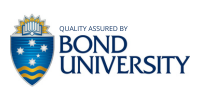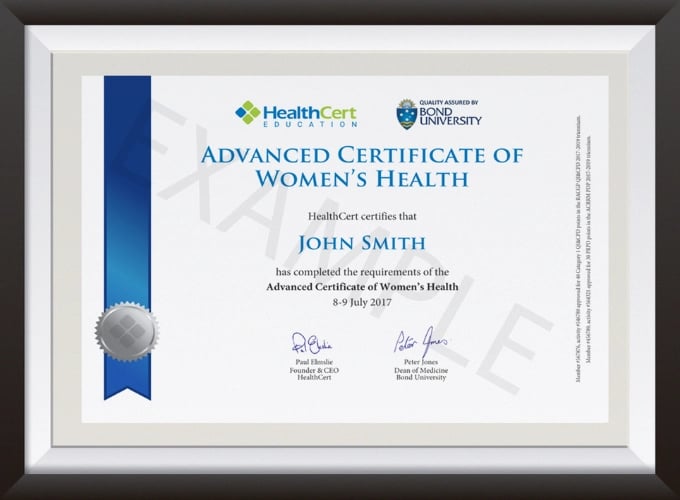Anal-rectal conditions are a frequent part of general practice, yet many GPs feel less confident...
.jpg?height=200&name=HCE%20HubSpot%20blog%20images%20600x350%20(50).jpg)
Explore medical conditions and concerns pertinent to female patients in primary care.

Acquire intermediate knowledge in women’s health issues commonly seen in primary care and provide appropriate treatments to improve patient outcomes.
- This course is perfect for practitioners with no to little training in this area.
- Explore the gender-specific health needs of women to provide high-demand services.
- This course is for physicians, nurse practitioners, and degree-qualified nurses.
- CPD-accredited and university-assured.
New to Women’s Health or not ready to commit to the full certificate?
Start with the Primary Certificate of Menopause & Women's Health: a focused, three-module course covering menopause, post-menopause, and hormonal health ($495).
You might also be interested in the Advanced Workshop of Intrauterine Systems.
Fulfils 50 hrs for medical professionals in Australia*
100% online
$1595
Special rates available
84.5 hrs
Self-paced
*provided an outcome measurement activity with a minimum of 5 hours is completed.

- Gain intermediate knowledge in women’s health issues such as sexual health, family planning, reproduction problems, pregnancy, obesity, and more.
- Learn the complexities of (and propose treatments for) the most common sexual health problems in women.
- Understand the role of general practitioners in reproductive health counselling.
- Manage the four common complications of pregnancy: miscarriage, obesity, gestational diabetes mellitus, and postnatal depression.
- Manage and treat the most common health issues of women in post-menopause.
Get unlimited access to all course content, additional learning materials, ongoing post-course support, and more.
This module on endometriosis, pelvic pain and ovarian cancer recognises that pelvic pain experienced by women can significantly impact their quality of life. Given the complex anatomy of the pelvis and lower abdomen, pelvic pain presents a diagnostic challenge that requires clinical awareness to ensure the detection of serious conditions including endometriosis and ovarian cancer. This module provides practitioners with clinical reasoning models to effectively assess and diagnose acute, chronic, or recurrent pelvic pain including diagnostic models and management guides. Three case studies on women of different ages and conditions illustrate the application of Murtagh’s self-posed questions. There are separate units focused on endometriosis and ovarian cancer and the summary provides a systematic approach to identify, diagnose and manage the various forms of pelvic pain.
This module recognises that sexual health is a significant component of a woman’s well-being and sexual difficulties can undermine relationships, impair self-esteem, mood and quality of life. This module examines the complex, multifactorial etiology of sexual dysfunction and proposes an evaluation and treatment approach that addresses the biological, psychological, sociocultural, and relational factors. The role of the doctor to broach the subject of sex is addressed and the module guides practitioners in overcoming their apprehensions. Taking a detailed sexual history is outlined as the basis for treatment, prevention, education and empowerment to embrace healthy, satisfying, and responsible sexual behaviour. The module offers education and suggestions for some of the most common sexual health problems such as difficulty achieving orgasm and reduced libido. The final unit weighs the impact of changing hormone levels on the sexual function of menopausal women and examines the role of menopause hormone therapy.
This module on advanced family planning (part 2) discusses the role of general practitioners in contraceptive counselling including comprehensive information on long-acting reversible contraceptives (LARCs). The nature of LARCs means that there is no difference between typical and perfect use. Their contraceptive effectiveness is outlined. Medical eligibility criteria for contraceptive use are applied to three types of LARC and includes important contraindications. It also presents discussion about the use of LARCs including how a clinician can reasonably exclude pregnancy and institute emergency contraception when warranted. Because of the suitability of LARCS for adolescents, content includes issues of consent and identifies key points of legislation related to informed consent. It also considers the termination of unintended pregnancy from request through to clinical referral. Finally, there is a discussion about the “quick start” method of contraception for women at higher risk of unintended pregnancy.
This module focuses on infertility. The experience of infertility or subfertility is often unexpected, confronting and can cause feelings of defectiveness, depression, and loss of identity. This module reviews the delicate and complex processes of ovulation, fertilisation, and implantation. It explores factors that contribute to infertility and subfertility including sex, mechanism, lifestyle and environmental factors, recreational drug use and concurrent illness. The module explores the psychological, social, physical, and financial burden of subfertility and infertility, and outlines intervention approaches. Patient case studies illustrate assessment and investigations required to construct a management plan for fertility problems. Content includes reproductive technologies such as in-vitro fertilisation, ovulation induction and DIY artificial insemination including the benefits and implications of these interventions. Adoption and surrogacy are also considered. Finally, the pivotal role of the practitioner in prevention, education, management, and support of women experiencing recurrent pregnancy loss is addressed.
This module considers four common complications of pregnancy: miscarriage, obesity, gestational diabetes mellitus, and postnatal depression. It includes clinical presentation, assessment, important considerations and management options. For example, when considering a management plan for miscarriage, a woman’s emotional distress and her need for control needs to balance with her physical welfare. Investigations of recurrent miscarriages are included. The increased risks of adverse outcomes associated with pre-conceptional obesity and excessive weight gain during pregnancy are covered including potential antenatal, intrapartum, and postpartum obesity-related complications. It also discusses how to conduct sensitive conversations about managing gestational weight gain. A classification of the risk factors for gestational diabetes introduces the adverse complications for both mother and infant including epigenetic dysregulation. In conclusion, the role of the practitioner is discussed as a crucial point of care for perinatal depression and comorbid anxiety symptoms.
Breast cancer prevention is dependent upon early detection however screening and surveillance should be based upon each woman’s estimated risk. This module categorises breast cancer-associated risk factors according to potency and mutability and includes validated tools with which a risk assessment can be undertaken. The module discusses risk-appropriate screening strategies. Discovering a new breast symptom can be extremely worrisome and although most are benign, more than half of breast cancers are diagnosed this way. The module outlines the highly effective triple test approach which allows practitioners to evaluate a new breast symptom, malignancy risk and reassure or refer women, as necessary. The module addresses the clinical presentation a variety of breast changes including mastalgia and breast cancers. For each condition, there is an examination of the relevant investigations, management approaches and surveillance.
This module discusses the role practitioners play in the primary prevention, screening, evaluation, treatment and ongoing monitoring of comorbidities in overweight and obese patients. Sustained behavioural change for these patients is predicated on a long-term, collaborative relationship between patient and doctor. Guides are included for eliciting the patient's level of change-motivation and offers a framework for structuring lifestyle counselling consultations. The module identifies four pillars of management: patient education and health literacy, lifestyle modifications, medication and weight loss surgery. As a first-line therapy, education and lifestyle interventions including physical activity and diet form the foundation for change. Beyond these interventions, the adjunctive role of medications is also discussed. The pharmacodynamic effects, administration and monitoring of three TGA-approved medications are considered. Bariatric surgery, the primary mechanism, the effectiveness and indications are also outlined. The module discusses the drivers of obesity and the practitioner’s role in primary prevention through education and advocation.
As estrogen deficiency begins to dominate in post menopause, women may experience health issues and escalated risks. This module examines the aetiology, compounding factors and socioeconomic burden. Content includes the medical and complementary management of osteoporosis, genito-urinary syndrome, mood disorders and cardiovascular disease. It provides an outline of the risk factors associated with osteoporosis and fragility fractures. It discusses the tools to assess fracture risk as well as the criteria for, and interpretation of DXA scans. Lifestyle interventions and pharmacotherapy are also considered. Together with general care, non-hormonal measures and the role of topical or systemic estrogen therapy are considered. Genito-urinary syndrome caused by the hypogenic state of post menopause is discussed. The importance of a mental health assessment for post-menopausal women is emphasised including risk factors and management of depression and anxiety. The module concludes with an overview of cardiovascular disease, the risk factors (including the impact of estrogen deficiency), and the evidence and parameters for hormone therapy.

General practitioner and GP supervisor
Associate Professor Debbie Kors is the founder and joint owner of a private teaching general practice in Port Macquarie, Australia. She works there as a general practitioner and GP supervisor of GP registrars and medical students.
A/Prof Kors is a passionate advocate for the profession of general practice. She is a Conjoint Associate Professor in Primary Health Care at the UNSW Rural Clinical School, Port Macquarie campus and has previously worked as a senior medical educator with North Coast GP Training. In 2010, she was nominated for and won the General Practice Education and Training GP Supervisor of the Year award.
A/Prof Kors holds a MBBS (first class honours), Fellowship of the RACGP, Masters of Family Medicine (clinical), Diploma of the Royal Australian College of Obstetricians and Gynaecologists, Graduate Diploma of Medical Education and a Certificate of Family Planning.

Senior lecturer at Sydney University
Dr Christine Ahern has worked as a general practitioner in rural NSW since 1983, often with Aboriginal and Torres Strait Islander communities. Her special interests include women’s health and education.
Dr Ahern is a senior lecturer at Sydney University and has previously been the Director of Training for North Coast GP Training. In 2011 she was named the General Practice Education and Training Medical Educator of the Year, a prestigious national award. Dr Ahern holds a MBBS and FRACGP.

FRACGP
Fellow of the Royal Australian College of General Practitioners
Bachelor of Medicine Bachelor of Surgery
Bachelor in Sciences (First class Honours in Neuroscience)
Diploma in Child Health
Diploma of the Royal College Obstetricians and Gynaecologists
Diploma of Family Planning & Sexual Health
Dr Evangelia (Valia) Francis is a GP. Dr Francis enjoys all aspects of General Practice but is especially interested in skin medicine, women's health and medicine of the elderly.
Originally from the coastal town of Kavala in Greece, Dr Francis is involved in teaching medical students as a Conjoint Lecturer in the Rural Medical School of Port Macquarie as well as teaching registrars. It is a very fulfilling aspect of her work that has been greatly inspired and supported by the senior educators at her practice.
When not at work, Dr Francis tries to fight waves with surf or paddle boards (so far they always win!), is training hard to become the next MasterChef winner, and enjoys reading books and learning new languages.

Dr Kate Moriarty works in private general practice in Port Macquarie, Australia, where she is also a supervisor of GP registrars and of medical students. She is a senior lecturer for UNSW Rural Clinical School, Port Macquarie campus. She has special interests in women’s health and medical education.
She holds a Bachelor of Medicine (honours), Fellowship of the RACGP and a Diploma in Child Health.

Dr Sharon Sykes works in private general practice in Port Macquarie, Australia where she is also a supervisor of GP registrars and of medical students. Dr Sykes served 18 years in the Royal Australian Air Force before becoming a general practitioner. She has a special interest in medical education and has previously worked as a medical educator for North Coast GP Training.
She holds a MBBS, Bachelor of Applied Science (Med Lab Sci) and a Fellowship of the RACGP.
If you are new to Women’s Health or not ready to commit to the full certificate, consider the Primary Certificate of Menopause & Women’s Health: a three-module, low-commitment entry point focused on midlife care for women. Ideal if you are new to this area or want a focused update. Covers menopause, post-menopause, and hormonal health ($495).
$1595
*provided an outcome measurement activity with a minimum of 5 hours is completed.
Bundle two courses and save 5%, or three courses and save 10% upon enrolment.
Talk to us about deferred payment options, registrar scholarships and special rates.
*For Australian residents only: Online course prices are shown exclusive of GST. If you are GST-registered, please enter a valid ABN at checkout to ensure GST is not applied. Otherwise, 10% GST will be added at checkout. View our FAQ for more information.


HealthCert courses have become the standard by which you gauge all others.
Dr K. Abolarinwa
Good courses with excellent speakers. I particularly enjoyed the case study scenarios which helped to integrate the knowledge gained.
Dr A. Tucker
This is the pathway to improve your confidence and evolve into the GP you aspire to be.
Dr S. Shinwari
| RACGP Activity Number | ACRRM Activity Number | Activity Title | Education Hours | Performance Hours | Outcome Hours | ||
|---|---|---|---|---|---|---|---|
| 469376 | 38397 | Sexual Health | 469376 | 38397 | 5 | 6 | 0 |
| 469416 | 38404 | Post menopause health issues | 469416 | 38404 | 4.5 | 6 | 0 |
| 469363 | 38396 | Endometriosis, Pelvic Pain and Ovarian Cancer | 469363 | 38396 | 5 | 6 | 0 |
| 469391 | 38399 | Reproduction problems | 469391 | 38399 | 5 | 6 | 0 |
| 469379 | 38398 | Family Planning (Advanced 1) | 469379 | 38398 | 4.5 | 6 | 0 |
| 469404 | 38402 | Breast Problems | 469404 | 38402 | 4.5 | 6 | 0 |
| 469408 | 38403 | Obesity & Overweight Management | 469408 | 38403 | 4 | 6 | 0 |
| 469398 | 38401 | Pregnancy Complications | 469398 | 38401 | 4 | 6 | 0 |
| 809657 | 38419 | Pelvic Pain Outcome Improvement Activity | 809657 | 38419 | 0 | 0 | 8.5 |
| Total hours | 36.5 | 48 | 8.5 | ||||
View the CPD Hours for all HealthCert Education activities.
The purpose of outcome measurement activities is to improve your clinical confidence in managing an identified learning gap. Outcome measurement activities are not a requirement of our Professional Certificate of Advanced Certificate courses; they are a requirement for Australian CPD purposes.
HealthCert Education provides a variety of outcome measurements activities to suit your needs:
The Advanced Certificate of Women's Health is tailored for medical practitioners who wish to improve patient outcomes by managing common women's health issues in general practice. This qualification is stage two of the Professional Diploma of Women’s Health.
This course is for physicians, nurse practitioners, and degree-qualified nurses. The prerequisite for this Advanced Certificate course is the successful completion of the HealthCert Professional Certificate of Women’s Health (or a qualification deemed equivalent). HealthCert also highly recommends successful management of at least 25 cases of women’s health issues prior to enrolment.
Participants do not have to pass an IELTS test but, as the courses are delivered in English, proficiency in listening, reading and writing English is assumed.
Participants will require access to a computer/laptop, an internet connection and a basic level of technology proficiency to access and navigate the online learning portal.
A module in this course — "Endometriosis" — is recognised under the Rural Procedural Grants Program (RPGP). Eligible rural GPs may be able to apply for partial reimbursement of course fees (subject to RPGP criteria. Learn more >
This certificate course meets the minimum 50 hours CPD annual requirement across all three mandatory CPD activity types, provided an outcome measurement activity with a minimum of five hours is completed. You may use an optional HealthCert outcome measurement activity or develop your own.
Outcome measurement activities are not a requirement of Professional or Advanced Certificates.
Upon successful completion of the exam, course participants will receive the Advanced Certificate of Women's Health and CPD hours.
This certificate course:
To learn more about the delivery of certificates in Australia and overseas, please visit our FAQs.
Professional Diploma Pathway
This course is the second stage of the Professional Diploma of Women's Health. The education pathway is: Professional Certificate of Women's Health, Advanced Certificate of Women's Health, and Professional Diploma of Women's Health.
You might also be interested in the HealthCert Advanced Workshop of Intrauterine Systems or the Primary Certificate of Menopause and Women's Health.
This organisation is an RACGP-accredited CPD provider under the RACGP CPD Program.




Don't see your question? Explore other faqs or talk to us.
Fees will vary based on the program and study option selected (fully online vs online + optional practical workshop). Payments can be made upfront or in monthly instalments. Special rates and various payment options are available. GP registrars and doctors in training enjoy a scholarship of up to $500. Talk to us to learn more.
Completion of any HealthCert course or attendance at an event will enable you to access the HealthCert Alumni Program which includes:
HealthCert Education is pleased to issue digital credentials for alumni. Digital credentials are a permanent online record of your successful completion of a HealthCert course and are issued to all course participants in addition to PDF certificates. If you are based in Australia, you also have the option to order a hard copy of your digital certificate for a small additional fee.
The recommended study duration of this certificate course is 84.5 hours, which includes study of the pre-course activities and readings, online lectures, live tutorials, and online assessment. This self-paced course offers the flexibility of 100% online study in your own time, at your own pace, in your own home or office, with no mandatory face-to-face requirements. You are not required to be online at specific times but can view and replay video lectures at your convenience.
All HealthCert courses meet World Federation of Medical Education standards. This certificate course qualifies for CPD hours from the Royal Australian College of General Practitioners (RACGP) and the Australian Council of Rural and Remote Medicine (ACRRM) in Australia. It is recognised by the Royal New Zealand College of General Practitioners (RNZCGP) in New Zealand. It is recognised by the Hong Kong College of Family Physicians (HKCFP) in China. It is a self-submitted activity in Dubai and the United Kingdom. It is a self-submitted activity through the College of Family Physicians in Canada. If you live or work outside one of the above-mentioned countries, please contact us on admin@healthcert.com to discuss whether this course can be recognised in your country.
Want to stay up-to-date with the latest case studies, podcasts, free video tutorials and medical research articles pertinent to primary care?
Our Education Advisors can assist you with any queries and tailor our education pathway to suit your current expertise, interests and career goals.